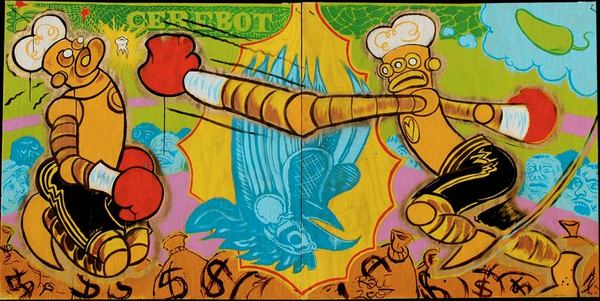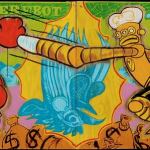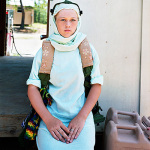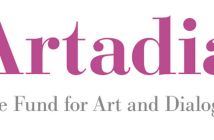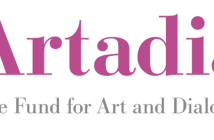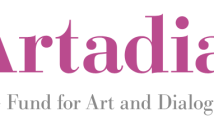Last week, Artadia announced the seven winners of their Boston awards. In light of this, I sent a couple of questions to the winners, to get a sense of their experiences. Four artists responded: Amie Siegel, Claire Beckett, Joe Zane and Raul Gonzalez. Below are their thoughts.
1. Having gone through the whole process of application, finalist, and awardee, what are your thoughts on the experience? I realize that this is a somewhat inane question so I'll flesh it out a bit. I am curious about your thought process because the anticipation can be overwhelming. On one hand the stakes involved are enormous - if you win, it validates your work and brings some pretty great exposure- however, there are the emotional complications around the act of competing with other artists (some of whom might be friends). I'd like to know what you think.
Raul Gonzalez: The experience was wonderful . The lead up to the visit was very similar to how I would prepare for an exhibition, deciding which works should be shown over others with an outline of how the presentation should proceed. Meeting the artists and becoming familiar with their work was exciting, I've always been told that Boston has a small community of artists and while I knew a few of the artists I found it refreshing to meet artists with whose works I was unfamiliar. I was honored to be surrounded with this talented group of hard working individuals. The artists in this group are very diverse and talented within their practices and are doing it to create and not to compete, I continued to create and develop ideas to prepare for my visit.
Amie Siegel: You know I don't believe I thought about it that way. It seemed more like it would be a studio visit with curators whose work I've found of interest, and indeed it was a compelling conversation.
Joe Zane: Well, fortunately for me I didn't really have time to get anxious about this one. Artadia was one of several pokers I had in the fire at this time. And the process was remarkably quick. There was hardly time to get used to used to each phase before you were on to the next one - especially the time between the studio visits and the announcement. It was just 2 days! I'm pretty grateful for that. Waiting is horrible. As far as competing against other artists; I didn't really have a sense of competing with this. Artadia was very supportive of all the finalists and there are seven spots. It's not the 'there can be only one' mentality.
Claire Beckett: Something about the Artadia process made the stakes feel very high, probably it was the effect the two-tiered jurying system and then there was the small matter of having 3 curators in my studio at one time!
2. Has this experience had an effect on the work you are currently making?
RG: The work I am currently making is still being developed and I will continue to expand on the ideas I presented to Artadia for a life outside of my studio. I look forward to being able to propose ideas for future exhibitions relating to the "Pelt" series and beyond.
AS: See below.
JZ (answering 2 and 3): No. or at least not yet. It's only been a few days, so it hasn't really sunk in yet. I can't speak for the other artists, but I don't really work in budget conscious way (probably stupid). I think of what I want I want to make and then I figure out how to make it happen. That said, there may be some compromises in material choice or scale that I won't have to worry about down the line, but in general it doesn't really change the way I work. It just makes it a LOT easier.
CB: The curators brought up several interesting new ideas in relation to my work that I am thinking about and researching right now, so I guess the answer is yes.
3. This is probably part two of question 2 but I'm wondering if receiving the award has completely shifted what you had been planning to do? Where you making something and then realized that "whoa, now I can do project X that I never thought I could do?"
RG: See above.
AS: I tend to work on a few things simultaneously, but when a significant grant or award happens, it's often a moment of moving one of those projects into the foreground. And that is always such a deliciously centering feeling as an artist, to be let loose into the space of one's work, a sudden opportunity to put other concerns in abeyance. Certainly the Artadia award has that effect.
CB: Receiving the award means that I can move forward with some of my plans to photograph. My process is very expensive and so it requires careful budgeting. I am very happy that I will be able to continue working with the influx of the award.
4. Now that you are an Artadia Awardee you are representative of Boston area artists. I am curious about your relationship to the city. If you are local does it make you proud of what Boston artists do and what Boston artists are capable of or if you haven't been born and raised here what does this mean to you? I ask this because I am very interested how our environments shape the work we make and the attitudes we carry towards our art community. I think that, to a degree, getting Boston artists into a larger cultural arena means more attention towards our community.
RG: Artists reflect what they are surrounded by, so in that regard Boston has had a huge impact on my development as an artist having lived here for most of my adult life. There are always improvements that can be made to our communities and I am proud to belong to a field that reflects our worlds issues and strives to create a commentary that shows us basic truths about ourselves whether good or bad while mentoring future generations of artists and creative thinkers.
AS: Given a fairly itinerant personal existence, and that the things I make often consider modes of cultural identification, I don't think I can provide a nearly adequate answer.
JZ: Hmm. I'm always very uncomfortable with these questions. In a way, I think it's sort of a weird question. I don't really think about my locality when I think about (my) art. I think about my work in a broad cultural context, within the history of art. I think about the art community, not our art community. I don't think of myself as a Boston artist, I think of myself as an artist. Personally, I think that speaks to the local community. if you want Boston artists to fit into a larger cultural context, then think about a larger a cultural context... that doesn't mean i don't live here for a reason or that i don't like it here. That's ridiculous. It just means that (for myself) those reasons don't factor into how I approach my art practice.
CB:I am not a native Bostonian, and therefore I do at times feel like an outsider in this city. On the other hand, after being a part of the art community here for 5 years, I do really define myself (and am defined by others) as a Boston artist. In fact, I would say that it is through my involvement with visual art that I feel at home in Boston. Being a Boston Artadia Awardee adds a layer of certainty and depth to this connection.
- Raul Gonzalez, from his website i heart cerebot
- Claire Beckett, Deidra Manaseo playing the role of “Bisma Alwaley,” Mousalah Village, Joint Readiness Training Center, Fort Polk, LA, from the series Simulating Iraq, chromogenic print, 2007
- Joe Zane, Schadenfreude, silver plated ABS, black walnut, 2008
Previously in Big RED & Shiny:
RAUL GONZALEZ @ NEGLAA video interview by HEIDI MARSTON AISHMAN in issue #82
2008 ICA FOSTER PRIZE FINALISTS: A CONVERSATION WITH JOE ZANE by JAMES A. NADEAU in issue #96
9 QUESTIONS WITH CLAIRE BECKETT by JESS T. DUGAN in issue #82
Gonzalez and Beckett images courtesy of the artists. Zane image courtesy of the artist and the Institute of Contemporary Art.

